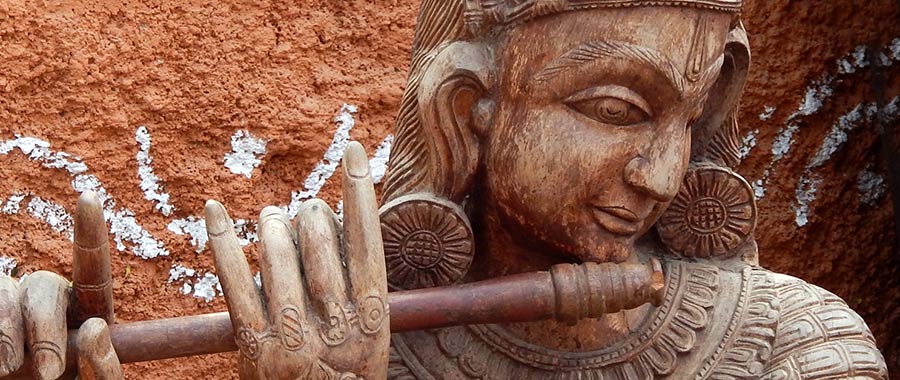The views expressed in our content reflect individual perspectives and do not represent the authoritative views of the Baha'i Faith.
Was Krishna historical? Devout worshipers of Krishna assume that he was as real historically as he is theologically and experientially.
As told in the great Hindu epic, the Mahabharata, Krishna was the charioteer of the warrior Arjuna. Hindus generally regard both Arjuna and Krishna as historical figures. Hindu tradition also holds that Krishna’s dialogue with Arjuna—as represented in the Bhagavad-Gita (“Song of the Beloved One,” which is part of the Mahabharata)—was historical as well. There was no reason to doubt either the historicity of Krishna or that of the Bhagavad-Gita, until Western scholarship seriously raised the issue.
Which raises another question: if Krishna was not historical, then how could Baha’u’llah be his spiritual “return”?
The Gita is classified as smriti (“that which is remembered,” i.e. tradition), a category of Hindu scriptures considered secondary to the Vedas, which are regarded as shruti (“that which is heard”). Although not the highest-ranked among the various Hindu scriptures, the Bhagavad-Gita, for all practical purposes, is the most important Hindu scripture, by virtue of the enormous popularity and influence that the Gita enjoys.
Like the “quest for the historical Jesus,” the quest for the historical Krishna has its merits. The reality and historicity of Krishna is of intrinsic interest. Much has been written about this multifaceted religious figure. But rather than review the literature within the compass of so short an article, we must ask ourselves whether or not summoning evidence that demonstrates that there was a historical figure known as Krishna does little to connect the teachings of the Bhagavad-Gita with such a figure, no matter how carefully reconstructed.
The Krishna of the Bhagavad-Gita, for all practical purposes, is the speaker of the Bhagavad-Gita itself, whoever the author actually was. Tradition has identified the one who teaches Arjuna, the warrior, as Krishna, his charioteer. The so-called “historical Krishna” is therefore not only shadowy and elusive, but almost entirely secondary to the voice of the Bhagavad-Gita itself. In terms of its historical influence, past and present, the divine teacher in the Bhagavad-Gita is, in many respects, the real Krishna. That said, more popular conceptions of Krishna, as a Divine being, are found in the tenth canto of the Srimad Bhagavata Mahapurana and other popular Hindu texts.
This brings us back to the claim made by the Guardian of the Baha’i Faith that Baha’u’llah is “to the Hindus the reincarnation of Krishna.” – Shoghi Effendi, God Passes By, p. 94. However, Baha’is do not believe in reincarnation or metempsychosis—which means transmigration, at death, of the soul into another body—as Shoghi Effendi explained:
The Baha’i view of “reincarnation” is essentially different from the Hindu conception. The Baha’is believe in the return of the attributes and qualities, but maintain that the essence or the reality of things cannot be made to return. Every being keeps its own individuality, but some of his qualities can be transmitted. The doctrine of metempsychosis upheld by the Hindus is fallacious. — Dawn of a New Day, p. 201.
In comparing the teachings of the Krishna of the Bhagavad-Gita and the teachings of Baha’u’llah, bear in mind that Hinduism, generally speaking, is a religion of “liberation” from the perpetual cycle of birth, death and rebirth.
However, according to N. Ross Reat, author of The Origins of Indian Psychology, the Rig Veda, which is the world’s oldest surviving scripture, utterly lacks the doctrine of reincarnation, which is a later development within Hinduism:
The Rig Veda lacks both the concept of rebirth and the notion of mystical release. Scrutiny of the text reveals instead the concept of a single afterlife in heaven or in hell. … The general Vedic concept of the afterlife is that after death, upon the performance of a proper funeral, one would hopefully enter an exceptionally pleasant paradise, the abode of the ancestors (pitr), where one could conceivably live forever. An everlasting afterlife, however, is thought to be contingent upon the continued performance of sustaining rites by one’s descendants. — N. Ross Reat, Origins of Indian Psychology, pp. 25–26.
Professor Reat goes on to say that “the search for references to rebirth in the Rig Veda has been going on for 2,500 years now, and is still being pursued by modern scholars” and that this “false attribution probably occurs because of the undisputed position of the Rig Veda as the supreme authority of Hindu orthodoxy.” – Ibid., p. 27.
The classical Hindu belief in reincarnation, formulated during the period of the Upanishads (purported commentaries on the Vedas), may have been originated, in part, based on Vedic passages that refer to recurring natural phenomena. But this imagery is poetic and therefore metaphorical. The problem is that such metaphors were later taken literally. Hindu philosophers basically took such metaphors as a point of departure for the concept of perpetual rebirth in the never-ending cycle of existence, from which the soul seeks liberation. However, there is no formal doctrine, much less any reference in the Rig Veda to the notion of rebirth, or transmigration.
The Hidden Words of Baha’u’llah makes the extraordinary claim to represent, in condensed form, the essence of the teachings and wisdom gone before:
This is that which hath descended from the realm of glory, uttered by the tongue of power and might, and revealed unto the Prophets of old. We have taken the inner essence thereof and clothed it in the garment of brevity, as a token of grace unto the righteous, that they may stand faithful unto the Covenant of God, may fulfill in their lives His trust, and in the realm of spirit obtain the gem of Divine virtue. — Baha’u’llah, The Hidden Words (Preamble).
If one were to choose a passage from Baha’u’llah’s writings that might best resonate with the Hindu doctrine of “liberation,” one passage that comes to mind is this:
O Son of Worldliness! Pleasant is the realm of being, wert thou to attain thereto; glorious is the domain of eternity, shouldst thou pass beyond the world of mortality; sweet is the holy ecstasy if thou drinkest of the mystic chalice from the hands of the celestial Youth. Shouldst thou attain this station, thou wouldst be freed from destruction and death, from toil and sin. – Baha’u’llah, The Hidden Words, p. 46.
This is “liberation,” pure and simple.
On this note, Baha’u’llah’s claim to be the “Promised One” of all religions obviously includes Hinduism. Whether such a claim is true, and whether or not Hindu prophecies have been fulfilled, is ultimately a matter of faith. If the prophecies of Kalki, the Tenth Avatar, are taken literally, then such a claim cannot be sustained. Similarly, the idea that Baha’u’llah is somehow the “reincarnation” of Krishna, when Baha’i teachings actually reject the notion of reincarnation, must be understood metaphorically, symbolically and spiritually—as all prophecies must ultimately be understood.
















Comments
Sign in or create an account
Continue with Googleor